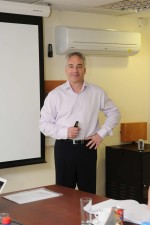Seeds of the New MAI

State-owned ChemChina soared to become a $30 billion behemoth in less than a decade since its formation, but there are no lingering doubts on who is directing the future of its agchem business.
“[Makhteshim Agan] is not just becoming a division of ChemChina,” says Chen Lichtenstein, MAI’s deputy CEO who engineered the deal. Perhaps this is because it would take chutzpah to attempt to do what the Israelis do as well as anyone else on the planet: Innovate. Differentiate. And do it fast.
CEO Erez Vigodman told a handful of media, including Farm Chemicals Intenational, at the company’s Tel Aviv headquarters last month, “We are coming from an off-patent space to develop a business model that fits with the changes in the industry. We are not on a quest to compete on prices.”
The new MAI is on a quest to compete for not just a bigger piece of China’s fragmented crop protection market, but the world’s. It is set to take its investment in novel chemistries forward by leaps and bounds, although it hasn’t attached a dollar figure to the plan for public consumption.
Says Vigodman: “We will become more similar to the RBCs [short for research-based companies like Dow, BASF and Syngenta.]” As pressure on generic players grows, he says, it has no other choice.
Top management is devising the new business model in China that fits with the country’s latest Five-Year Plan, which calls for the top 20 companies to account for more than half of industry sales by 2015, up from the current 30%.
The 66-year-old MAI, which captured $2.69 billion in sales last year, also is in the midst of hatching a new global brand. That yet-to-be-unveiled brand is designed to help push the company and its portfolio of 120 active ingredients to the true powerhouse status it craves (think Big Six).
“We need to come up with tailor-made, go-to-market systems in different countries and regions,” Vigodman says. MAI plans to roll out more formulation plants to serve customers in key large markets around the world – an endeavor already well underway with its addition of five facilities in the past two years, bringing its total to 14.
Flush with capital, MAI’s team is now in the process of assessing ChemChina’s hundred-plus subsidiaries, including Hubei Sanonda, Shandong Dacheng, Jiangsu Huaihe and Jiamusi Heilong, among others. MAI will select which companies it keeps as it builds a top-notch distribution platform, backward integrates as many novel AIs as possible and accelerates R&D spending. It also continues to explore acquisitions both inside and outside of China, according to Lichtenstein.
That is not all. MAI is laying the groundwork for a novel agricultural technologies division. It remains tight-lipped on the details, estimating the venture will take years to bear fruit. “We are planting the seeds. It will be a surprise,” Vigodman says.
This year, from a customer’s perspective, it is business as usual for the empowered crop protection giant. Expect real changes to start falling into place in 2013, when MAI and ChemChina will begin reporting results on a consolidated basis. The nuances of the business model will start to emerge at the end of this year, as MAI sets the stage for an initial public offering sometime in the next two-and-a-half years on the London, Hong Kong or New York stock exchanges.
“We don’t have any intention of going into the past,” says Lichtenstein. “The notion is to build together a global champion for the future.”






